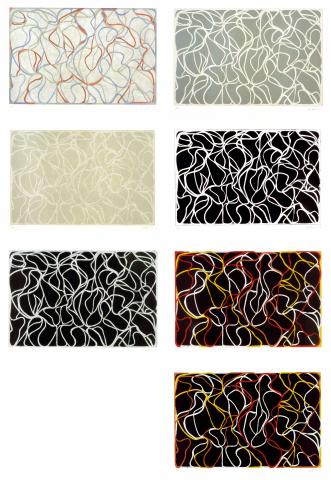MUSES AND MERES, 2001
BRICE MARDEN
Comprising:
(I) EAGLES MERE MUSES
one colour etching, four colour lithograph
(II) RED LINE MUSES
two colour etching, one colour lithograph
(III) GREYER MUSES
two colour etching, one colour lithograph
(IV) LINE MUSES
one colour etching, one colour lithograph
(V) MUSES WITH GRAPHITE
one colour lithograph with pencil drawing
(VI) BEYOND EAGLES MERE
two colour etching, four colour lithograph
(VII) BEYOND EAGLES MERE 2
one colour etching, four colour lithograph
56.0 x 76.0 cm each
each: signed, dated and numbered below image
Published by Gemini G.E.L., Los Angeles
Matthew Marks Gallery, New York
Private collection, Melbourne
Brice Marden, Niagara Galleries, Melbourne, 27 November – 21 December 2001, cat. 1 – 7 (illus. in exhibition catalogue)
Gemini G.E.L. Online Catalogue Raisonné, National Gallery of Art, Washington, cat. 63.2-8, online catalogue: https://www.nga.gov/gemini
The following paragraph is quoted from Garrels, G., Plane Image: Brice Marden Retrospective, The Museum of Modern Art, New York, 2006, pp. 77 – 78
‘Place defines what and how Marden paints. The places where he lives and works include Manhattan and Tivoli in New York State; Eagles Mere in Sullivan Country, north-central Pennsylvania, abutting the south-eastern edge of a densely wooded, mountainous state forest; and Hydra, an island southeast of the Argolid in the Peloponnese of Greece. Eagles Mere is something over six thousand miles from Hydra, nearly a quarter of the way around the globe (although at proximate latitude). The landscape there is wet, dark, and overgrown with moss and hemlock. In this the place reminds Marden of the eighth-century poet Cold Mountain’s descriptions of his retreat on the Chinese mountain of Tiantai, where it was cold, dark, and wet, all moss and pines and vines. Where the waters of the Hudson and the Aegean conjure history and grandeur, the water on Marden’s 400 acres in Eagles Mere is a lake created from a dammed stream that runs through the property. Aged stones survive in masonry ruins at water’s edge; a stand of pines dominates an island in the middle of the lake. The word “mere” derives from Old English for “small lake, pond, or marsh.”’
